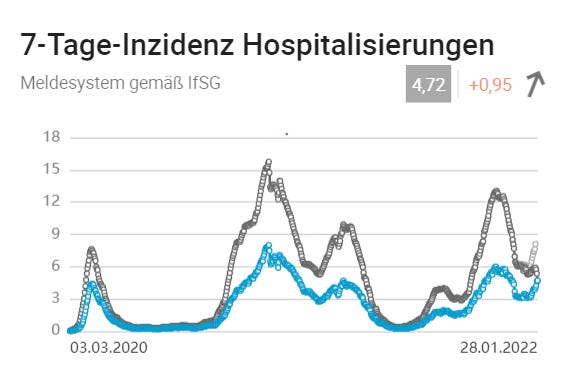A science editor for the Süddeutsche Zeitung can't work out what we're even doing here, but he wants us to keep doing it.
The pandemic is drawing to a close all across Europe. The Netherlands and Denmark are taking steps to end containment, following the lead of the United Kingdom. Germany’s own hysteric-in-chief, health minister Karl Lauterbach, expects 400,000 infections a day in February whatever we do, but he nevertheless insists we are “on the right path” in continuing our pointless restrictions.
All of this leaves Werner Bartens, the chief science editor at the Süddeutsche Zeitung, vaguely uncomfortable. What are we even doing anymore?
It’s unclear to many how they should behave right now. Should we continue to be cautious because the most difficult phase is yet to come? Or is it better to let the pandemic run its course, if everyone is just going to catch it anyway? Are we simply paralysed by fear, such that we can no longer return to normality? On the one hand, politicians are urging caution, while on the other hand, regional restrictions are being relaxed, even as the normal hospital wards are filling up with more Corona patients than at any time since the start of the pandemic.
That last sentence is a total lie.1 Hospitalisations are rising, but they’re not at their highest point, and ICU cases and death counts continue to decline.

Bartens first calls up a social psychologist to see if he can help him understand things.
“To me, the situation feels like the last third of a film: The tension is rising and everything is coming down to one decisive question,” says Mario Gollwitzer, a social psychologist at Ludwig Maximilian University in Munich. “Instead of good or evil, the question really is just: Will Omicron bring in the endemic phase?” Comparisons with other countries aren’t that useful for predicting this, because “Germany's special problem,” in the words of Lauterbach, is having the second oldest population in Europe … and a large number of unvaccinated elderly people, and this requires a special approach.
This doesn’t make any sense. The endemic phase begins when we decide it does; we could’ve declared Corona endemic last year if we wanted to. All endemic seasonal respiratory viruses surge in the winter. Otherwise, it hardly matters how many olds Germany has, or how thoroughly vaccinated they are. Nearly all susceptible people are going to get Omicron in the coming weeks whatever we do. It is the monsoon, and we are trying to stop the rain with umbrellas.
Bartens next calls up an immunologist, to see if he knows why we can’t just accept Omicron and get on with our lives.
Downplaying Omicron or trying to get infected at “vaccination parties” is risky, warns Clemens Wendtner of the Munich-Schwabing Clinic. “Germany, with its age structure and low vaccination rate, is very ill-prepared for Omicron spread,” says the infectious disease specialist. “It’s a misconception that the ordinary wards have only mild cases – some will have to be transferred to intensive care.” He adds that a look at the US shows that the death toll from Omicron is rising sharply. “You can’t underestimate how the Omicron wave will turn out, so there’s no need for recklessness on what I hope will be the last kilometres of the pandemic marathon.”
We need to take pointless and costly precautions because people are dying in the United States and some sick people get even sicker? You get the sense that Wendtner really resents Omicron’s mildness, that his strange little heart does a leap every time he has to transfer some elderly Corona patient to the ICU.
Ultimately, Bartens concludes that he has no idea why we’re doing this, and probably nobody else does either, but that’s fine, because uncertainty is good:
The honest approach, would be for all those involved to emphasise that there’s many questions they don’t know the answer to, says social psychologist Mario Gollwitzer. “Nobody likes uncertainty, but it has the advantage of allowing you to revise decisions when the situation changes.” On the other hand, conveying artificial confidence, for example by announcing a freedom day, is risky, he says. “This satisfies the desire for control in the moment, but leads to frustration and even more insecurity when it doesn’t materialise.”
We have to keep masking and vaccinating and hiding from the world because the future is uncertain and we don’t know what’s going to happen next. That is the state of containment discourse in Germany right now.
Someday, people – perhaps not Bartens, but other people – will realise that Corona isn’t the only risk in the world. Our restrictions are incredibly dangerous and represent a multitude of risks in themselves. Disrupting millions of lives and curbing social, cultural and economic activity for two years, will all have lasting consequences. This stuff has totally changed my life, and I can’t be the only one. In the coming years, we will discover, slowly and with growing unease, how much this has done to us, and our children, and all the complex and unpredictable damage we have caused – all for nothing, because SARS-2 will still be infecting people.
It’s always worth emphasising, that a lot of what you read in the press about Corona is just totally untrue, and these aren’t honest mistakes either. They all go in the same risk-magnifying direction.
https://www.eugyppius.com/p/why-bother-with-restrictions-if-everyones
Subscribe to eugyppius: a plague chronicle
We are witnessing an unprecedented, comprehensive failure of policy, medicine and science. The world will never be the same.